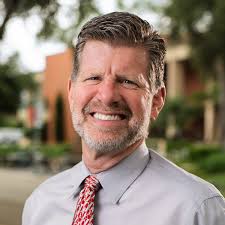
Connecting the Dots between Course Content and Life
I teach biblical/theological studies. Each semester, I seek to guide students toward a deeper understanding of my conclusions concerning the major theological points of the Old Testament. I teach them that, as a result of sin, the world in which we live is not the world as God created it to be. The world is “broken.” However, the amazing story of the Old Testament shows us that God, despite the sinfulness of humanity, is making a way for humanity to be reconciled to him. The brokenness of this world is the primary reason we find difficulty present in our lives on such a regular basis. The story of the Old Testament teaches us that God uses these various kinds of difficulties to command humanity’s attention so that they turn their hearts toward him in dependence.
My desire as a professor of the Old Testament is to find real connections to my students’ lives so that the Old Testament is not viewed as merely an ancient book, which has no real value to their contemporary world. And every semester, it is a battle because most of them are simply not old enough, nor do they have the life experiences that are sufficient enough, to lead them to more deeply understand the powerful truths of the Old Testament. Outside of the minor irritations of life, the majority of the freshmen or sophomore students in my courses lack that which would lead them to truly understand the theological points I am trying to make and, therefore, they can lack an interest in making the necessary connections. They still feel a little invincible and at the top of their game.
Enter our global pandemic. I could not ask for a better “soft ball” to be thrown at me. It is a perfect scenario for the teachings of the Old Testament to come alive. This global pandemic has created the opportunity to openly discuss the issues confronting our world, and even the issues that confront my students, with the goal of connecting all of it to the profound theology of the Old Testament. Every situation this global pandemic brings into their lives becomes a special opportunity for them to understand the deeper realities of living in this world as we know it and all of its subsequent difficulties. Even if it does not touch their own lives in meaningful ways, they are bombarded with constant news updating them on the tragedies that other people in this world are up against. They feel it. And they are moved by it.
As numerous emotional stories flow through various information platforms, it has an impact on them, making them more prepared to listen . . . and to think. So, my responsibility as a professor is to take full advantage of a crisis that I could not have planned. For my teaching, it is truly the “perfect storm” for the application of my course content. With the emergence of this global pandemic, my class is more interested in engaging the focus of my teaching. And they will be the better for it.
Of course, this causes me to reflect on what might be less obvious in the everyday events of our world, which, if properly utilized, could create the same opportunity for my students to impacted. Perhaps, as a teacher, I have grown somewhat lazy in my attempts to connect the dots for my students. This has led me to think more deeply about the way I approach my course lectures. Consider the many issues that potentially confront my students on a daily basis:
- • At a private Christian liberal arts university, costing around $40,000 per year, this may not be an issue for my students, but one cannot help but be aware of the persons who have made a bus stop their home or walk down the street pushing their shopping cart full of their life’s possessions or who scrounge around restaurant trash cans in search of food.
- • Sex or human trafficking. It is difficult to believe that either sex or human trafficking could be happening in our neighbor’s home across the street or in an apartment complex in close proximity to our home, but it is possible. These “invisible” people may be closer than we think. It is a horrible issue in our world, and we can put it out of our minds.
- • Drug/alcohol abuse. More people will die of drug abuse in the USA than will die of this global pandemic in the year 2020. Drug abuse wrecks families, tears apart marriages, and leads to financial ruin. Students have more than likely seen the impact of this issue in one way or another.
My point is that, although these issues may not directly impact my students’ lives, the global pandemic might not either. But, unlike the global pandemic, these other issues exist continuously in the world which my students and I inhabit. Oftentimes, these issues become background noise to our comfortable little worlds, but they are there. My job as a teacher is to work harder to make these connecting points when my students might be having difficulty making connection on their own. Because of this, I am thankful for the global pandemic.
I know that my subject matter, the theology of the Old Testament, made it fairly easy for me to make the connections between course content and this global pandemic, but I assume that, with a little bit of thinking, you can do the same. And, if you do, it will make your course content come alive and your students will be better able to draw value from the content of your course. And, if we can do it with a global pandemic, then I bet we can do it better in the situations of everyday life. I encourage you to go for it!
Leave a Reply